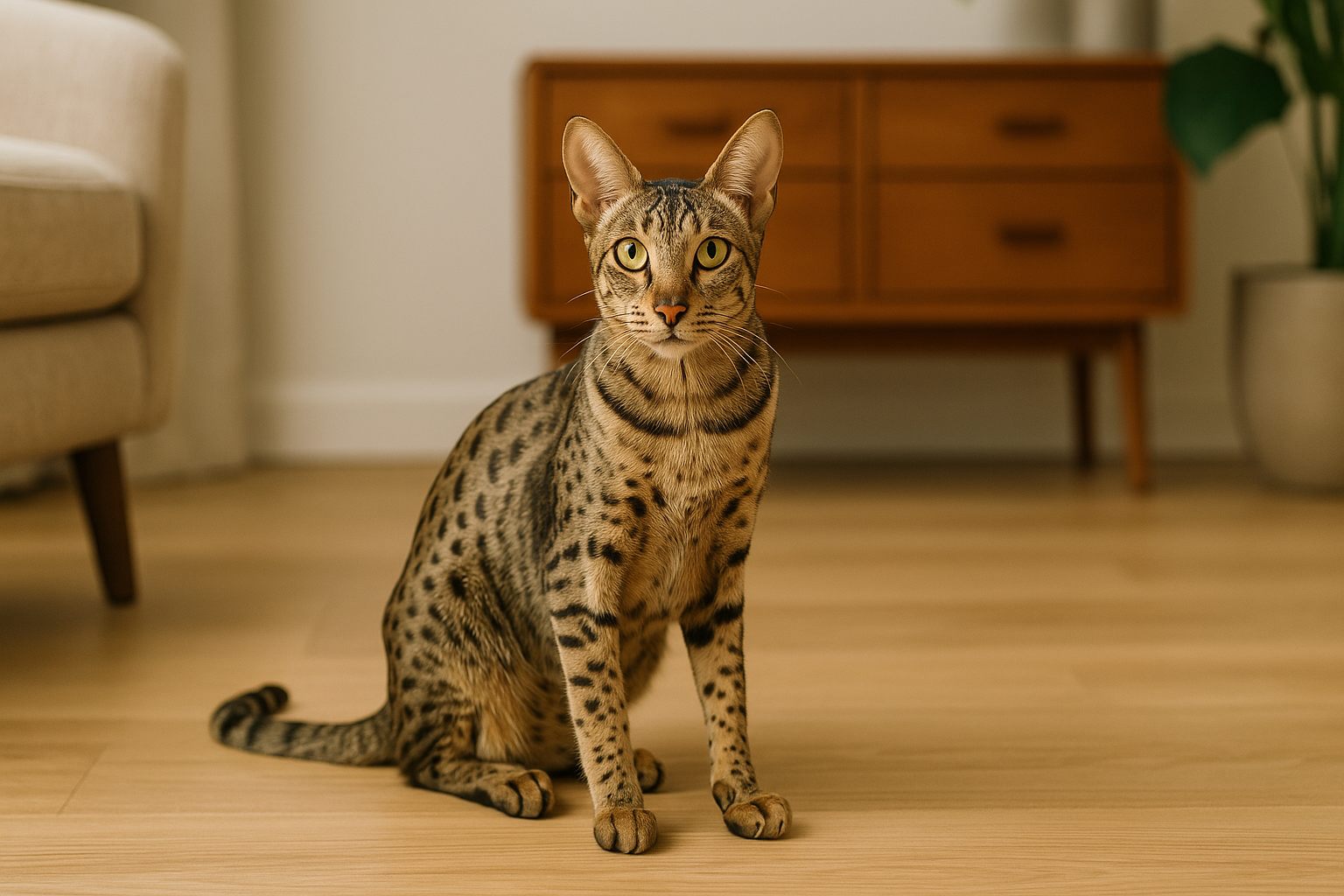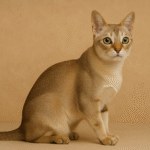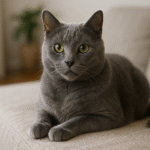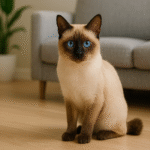Serengeti Cats are head-turners. With their tall, graceful build, long legs, and exotic spotted coats, they look like miniature leopards strutting through your living room. It’s easy to mistake them for a wild hybrid at first glance.
But don’t be fooled by the fierce appearance—this is a domestic cat breed through and through. Serengetis are social, affectionate, and full of playful energy. If you’re drawn to exotic-looking cats but want one that fits into everyday home life, the Serengeti might be your perfect match.
Quick Breed Facts
- Origin: United States (1990s)
- Breed registries: TICA
- Weight range: 8–15 pounds
- Lifespan: 12–15 years
- Coat: Short, dense
- Colors and patterns: Spotted tabby; gold, silver, and smoke backgrounds
- Eye color: Gold or amber
- Grooming: Low maintenance
- Activity level: Very high
- Affection level: Moderate to high
- Vocality: Talkative
- Good with children: Yes
- Good with other pets: Often, with socialization
History & Origin of the Serengeti Cat
The Serengeti Cat was created in the 1990s by conservation biologist Karen Sausman of Kingsmark Cattery in California. Her mission was simple but bold: develop a cat that looked like the wild African Serval—without using any wild cat DNA.
To make that happen, she crossed a Bengal (known for its gorgeous spotted coat) with an Oriental Shorthair. The result? A stunning domestic cat with long legs, oversized ears, and dramatic spots—wild in looks but sweet in temperament.
Personality & Temperament
Serengetis are highly active and intelligent cats that crave stimulation. They’re curious about everything, often following you from room to room or climbing to the highest perch they can find. Don’t be surprised if they try to talk to you—this breed is known for its vocal tendencies, often chirping or meowing to share its thoughts.
Though not always lap cats, Serengetis are affectionate and enjoy being part of the family. They get along well with respectful kids and other pets, especially if raised together. If you work long hours or travel often, a second feline companion might help meet their social needs.
Appearance & Coat
This breed is a showstopper. Serengetis have long legs, a lean muscular body, and a striking spotted coat that gives them a wildcat appearance. Their ears are large and upright, their necks long and elegant, and their tails relatively long and tapered.
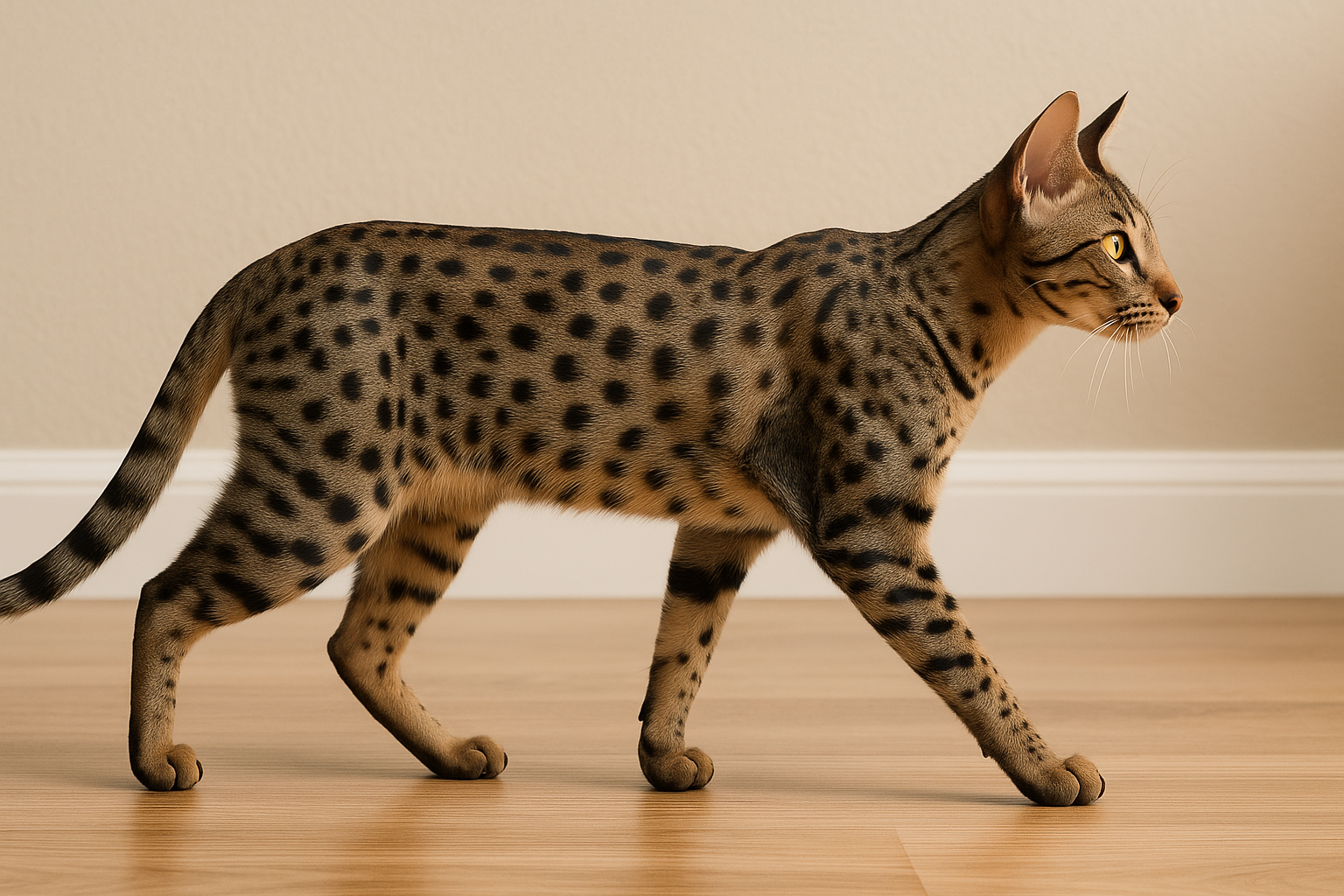
The short, sleek coat comes in gold, silver, or smoke with distinct black or dark brown spots. These spots can vary in shape and size, contributing to the breed’s unique, exotic look. It’s no wonder many people describe them as “miniature leopards.”
Activity & Play
If you’re looking for a low-energy lap cat, the Serengeti might not be your best match. These cats love to jump, climb, run, and explore. Their athleticism is part of their charm—and part of the challenge if you’re not ready for a busy cat lifestyle.
Some owners even install cat shelves or wall-mounted play zones to satisfy their climbing urges. Puzzle toys, feather wands, and laser pointers are must-haves to keep these energetic cats mentally and physically enriched.
Grooming & Care
Thanks to their short, tight coat, Serengeti Cats require minimal grooming. A weekly brushing is usually enough to keep their coat healthy and reduce shedding. They don’t tend to mat or tangle, but they do appreciate the bonding time that comes with gentle grooming sessions.
Regular nail trimming, dental care, and ear checks round out their basic needs. If started young, most Serengetis tolerate grooming quite well.
Health & Lifespan
As a relatively new and rare cat breed, the Serengeti doesn’t have many breed-specific health concerns yet. They tend to be healthy, robust cats, living an average of 12–15 years. Still, it’s wise to watch for issues common in their parent breeds, such as heart conditions (from Bengals) or dental disease (common in many cats).
Always work with a reputable breeder who screens for genetic conditions, and schedule regular vet checkups to keep your cat in peak condition.
Family Compatibility
Serengeti Cats are a great fit for active families, especially those who want a social, intelligent cat that’s fun to interact with. Their playful, sometimes mischievous nature makes them entertaining companions, though their high energy might be a bit much for households that prefer mellow pets.
They can adapt to apartment living if given plenty of vertical space and playtime. A tall cat tree, window perch, or shelving system can go a long way in keeping this breed happy indoors.
Recommended Supplies
Because of their energy and athleticism, Serengetis do best with a well-rounded enrichment setup. Offer toys that challenge their minds and bodies—and don’t forget a cozy spot to crash when they finally slow down.
Interactive feeders, high perches, and vertical space make a big difference in their daily routine. A bored Serengeti can quickly turn mischievous, so it’s best to stay one step ahead with engaging setups.
Serengeti Cat FAQs
Are Serengeti cats hypoallergenic?
No cat is truly hypoallergenic, and the Serengeti is no exception. However, their short coat may shed less than other breeds, which some allergy sufferers find easier to manage.
How big do Serengeti cats get?
Serengeti Cats typically weigh between 8 and 15 pounds, with males generally larger than females. Their long legs and athletic build can make them appear taller and leaner than they actually are.
What is the Serengeti cat price range?
The Serengeti cat cost can vary based on location, breeder reputation, and lineage. Expect to pay anywhere from $600 to $2,000 for a kitten from a responsible breeder.
Is the Serengeti breed related to wild cats?
No. While it resembles a Serval, the Serengeti Cat is a fully domestic breed. It does not contain any wild DNA, unlike hybrids such as the Savannah Cat.
Is the Serengeti Cat Right for You?
If you love the look of a wild cat but want the temperament of a domestic one, the Serengeti breed strikes that balance beautifully. These spotted cats bring a lively, social energy to the home and form strong bonds with their people. Just be ready to provide plenty of playtime, climbing options, and mental enrichment.
Whether you’re enchanted by their leopard-like spots or drawn to their affectionate, intelligent nature, Serengeti Cats offer a unique and rewarding pet experience.

